Ballymurphy Inquest: Coroner finds 10 victims were innocent
By Colm Kelpie
BBC News NI
Ten people killed in west Belfast almost 50 years ago in the wake of an Army operation were "entirely innocent", an inquest has found.
The inquest, which began in November 2018, examined the deaths in and around the Ballymurphy area of west Belfast in August 1971.
The shootings happened after an operation in which paramilitary suspects were detained without trial.
Victims included a priest trying to help the wounded and a mother of eight.
Nine of the 10 victims were killed by the Army, the coroner said.
The coroner could not definitively say who shot the tenth victim, John McKerr.
Mrs Justice Keegan, who delivered her findings over the course of more than two hours, said the deaths took place during Northern Ireland's Troubles in a "highly charged and difficult environment".
The killings happened over three days immediately following the introduction of internment - the arrest and detention of paramilitary suspects without trial.
She noted that during that time there was widespread disorder.
Across Belfast alone on 9 and 10 August 1971, it was recorded that there were approximately 12 explosions, 59 shooting incidents, 17 reported deaths, 25 reported injuries, 13 incidents of rioting, 18 reports of arson and other reports of civil disorder of various kinds.
But Mrs Justice Keegan concluded, to a round of applause: "What is very clear, is that all of the deceased in the series of inquests were entirely innocent of any wrongdoing on the day in question."
Eileen McKeown, daughter of victim Joseph Corr, said her family was "delighted" with the findings and added that now the "world knows that they are innocent".
A UK government spokesperson said it would now "take the time to review the report and carefully consider the conclusions".
Mrs Justice Keegan said the effects of the killings on the families of the 10 victims had been "stark".
Inquests were held into the deaths in 1972, but they were separate and returned open verdicts.
The new inquests, which began in November 2018, have been held together
The court heard almost 100 days of evidence from more than 150 witnesses.
These included more than 60 former soldiers, more than 30 civilians and experts in ballistics, pathology and engineering.
What did Mrs Justice Keegan say?
Father Hugh Mullan, 38 and Francis Quinn, 19
The coroner found both men were shot by the Army on 9 August 1971, although neither was armed.
She said there was no evidence Mr Quinn had a gun or was in close proximity to someone who had a gun.
She said she was quite convinced Fr Mullan was a "peace-maker" and that he was carrying a white object at the time that he was shot.
Mrs Justice Keegan said there was enough evidence both men were trying to render help to someone injured at the time.
She concluded, in the case of both men, that "the use of force was clearly disproportionate".
Pat Quinn, the brother of Francis Quinn, later said it was a great day for the families, "but it's also a bittersweet day".
Joan Connolly, 44; Daniel Teggart, 44; Noel Phillips, 19; Joseph Murphy, 41
Mrs Justice Keegan found there was "no doubt" the four were shot by the Army in August 1971.
She acknowledged the Army was coming under fire from gunmen in the area at the time, but she concluded the use of force against the deceased was "clearly disproportionate".
She said they were innocent, unarmed and were "posing no risk."
The coroner said it was clear the environment was difficult at the time, with many people, including children, out on the streets but she said the state had failed to establish that the shootings were justified.
Ruling on a claim by a soldier that 33 rounds of ammunition were found in a pocket on clothes worn by Mr Teggart, she said if this was the case it was "quite an amount of ammunition" yet it was not mentioned by other soldiers.
She concluded she was not satisfied that "this fact is proven."
Later, Briege Voyle, Ms Connolly's daughter, said the Army told a lie 50 years ago and the UK government covered up that lie.
"The coroner's findings are clear she was innocent," she said.
Janet Donnelly, the daughter of Joseph Murphy, said that for 50 years her family had lived with the knowledge that her father was "an innocent civilian murdered by British paratroopers".
Edward Doherty, 31
Mrs Justice Keegan said Mr Doherty was an innocent man when he was shot, who posed no threat. She said he was on the street and had come across events on his way home.
She said he was not linked with the IRA and there was was no sign of petrol or explosives on his body.
She said a British soldier, known as M3, fired in response to a petrol bomber and that Mr Doherty was in the line of fire.
The coroner said the use of force was disporportionate in relation to the risk posed to the soldier.
"Unfortunately, Mr Doherty was caught up in what happened in this incident and he lost his life as a result," Mrs Justice Keegan said.
Later on Tuesday, Mr Doherty's sister, Kathleen, said she was "elated that my brother's name is eventually cleared".
"He was a good man and he was a humble man," she told the BBC's Evening Extra programme.
Joseph Corr, 43, and John Laverty, 20
Mrs Justice Keegan found that on the balance of probability, both men were shot by the Army.
She said it was wrong to describe the two men as gunmen and that rumour should be dispelled.
She also said the Royal Military Police investigation of the killings at the time was inadequate.
Carmel Quinn, Mr Laverty's sister, later said "no-one cared" about her brother's death.
"He was my big brother and we would never give up fighting for him," she said.
Eileen McKeown, Mr Corr's daughter, said her family was "delighted" with the rulings and that the "world knows that they [the victims] are innocent".
John McKerr, 49
Mrs Justice Keegan said Mr McKerr was an innocent man who was not acting in any suspicious way when he was shot. She said he was "indiscriminately shot on the street".
She said he had "no association with the IRA" and that his family could now know that any claim to the contrary could be allayed "once and for all."
She said he may have been shot by a stray bullet but it was not possible for her to say where any shot may have come from.
She said the evidence was not clear or consistent in this case and there was no direct evidence as to who fired the fatal shot.
The coroner said it was shocking there was no real investigation into his death at the time.
"It is in itself a serious indictment of the state's failure to properly investigate the death of an innnocent civilian," she said.
Concluding her remarks after more than two hours, Mrs Justice Keegan said she wanted to acknowledge the families of the victims and said it must be a difficult occasion of remembrance.
She added: "I do express the hope that some peace may now be achieved now that these findings of the inquest have been delivered."
At the scene:
Catherine Morrison, BBC News NI
After the findings were delivered, the families of the victims streamed out of the makeshift courtroom at the Waterfront conference centre in Belfast wreathed in smiles.
Hugging each other, some crying with relief and with joy, they spoke of their delight at the coroner's findings: the names of their loved ones finally cleared after 50 years.
Pat Quinn, whose brother Frank was shot dead during one incident on 9 August 1971, said he shed tears for the first time in many years.
Others remembered family members who have since died and were not here for today's ruling.
There were cheers as relatives left and had their photographs taken by the waiting press in the bright sunshine.
It's been a hugely significant day for these families.
Mrs Justice Keegan said often, during the hearings, that she wanted to hear evidence that would help her understand what had happened.
She has had to decide the circumstances of how each person died on the balance of probability.
She has also had to determine who was there, where the shooting came from, who she thought fired the fatal shot, and the circumstances in which those shots came to be fired.
Other information or witnesses were missing.
One person, known as Witness X, offered to pass on what he knew about Ulster Volunteer Force (UVF) snipers in the area.
But he never gave evidence in the end and the court concluded that ballistics evidence cast some doubt on what he had indicated that he would say.
There was clear testimony at the inquest that the Official IRA and the Provisional IRA were in the area on those days and did open fire on certain occasions. None of them testified.
What has been the reaction?
Northern Ireland's Deputy First Minister Michelle O'Neill, the vice-president of Sinn Féin, said the victims were innocent and the families had been vindicated.
Justice Minister Naomi Long tweeted that the families "had to battle too hard and too long" to hear Tuesday's verdict.
DUP MP Sir Jeffrey Donaldson said the inquest had allowed people who were killed and who were innocent "to have their case put forward" and that moving forward a legacy process was needed which "enables innocent victims - particularly those who were victims of terrorism - to have the opportunity of access to justice".
SDLP leader Colum Eastwood said he was "inspired by the fearless dedication of these families".
Taoiseach (Irish Prime Minister) Michéal Martin said "the legacy of violence in Northern Ireland remains a deep wound".
Shadow NI Secretary Louise Haigh said the families' 50-year wait was "a profound failure of justice".
A UK government spokesperson said: "We note the coroner's findings which have been long awaited by the bereaved families of the deceased, military personnel and their relatives.
"We recognise how difficult the process has been for all of those affected by the events of August 1971 and the inquest. We will now take the time to
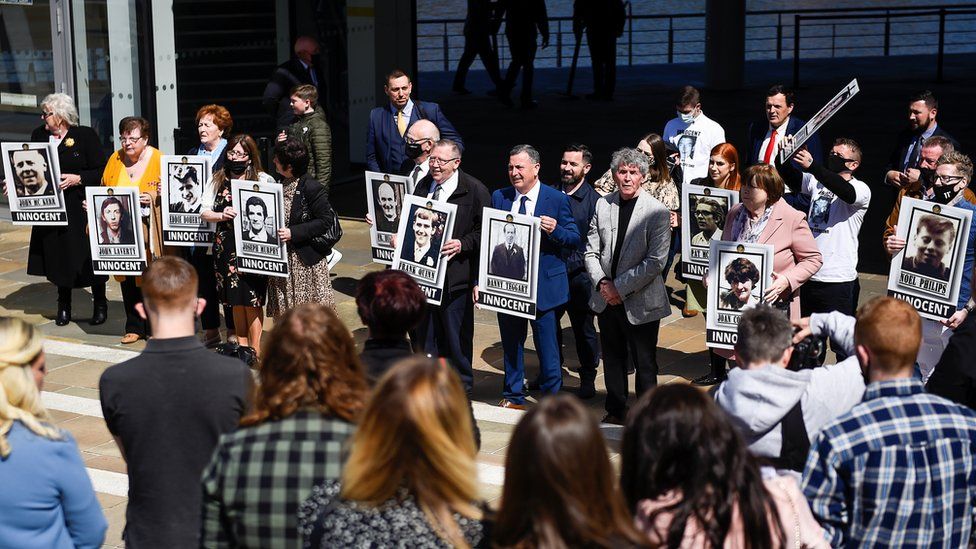

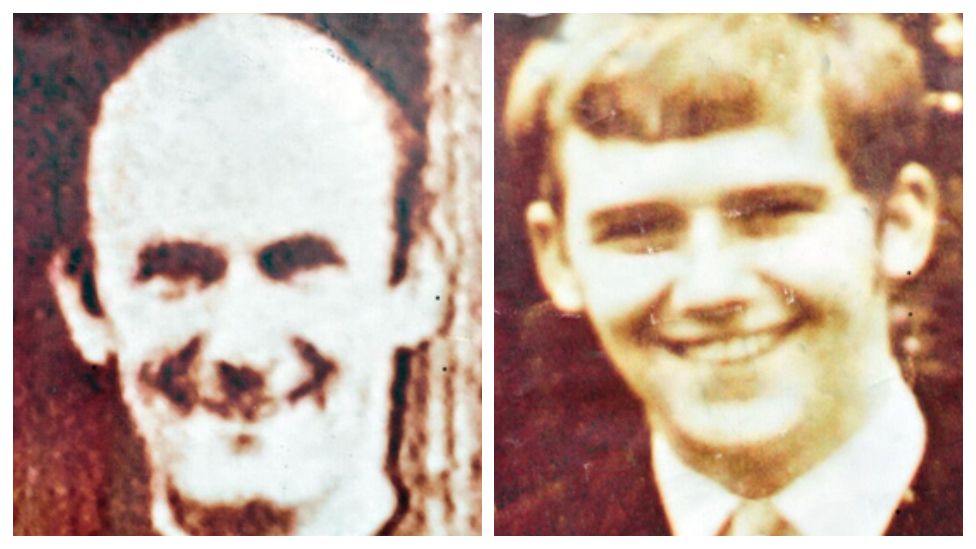
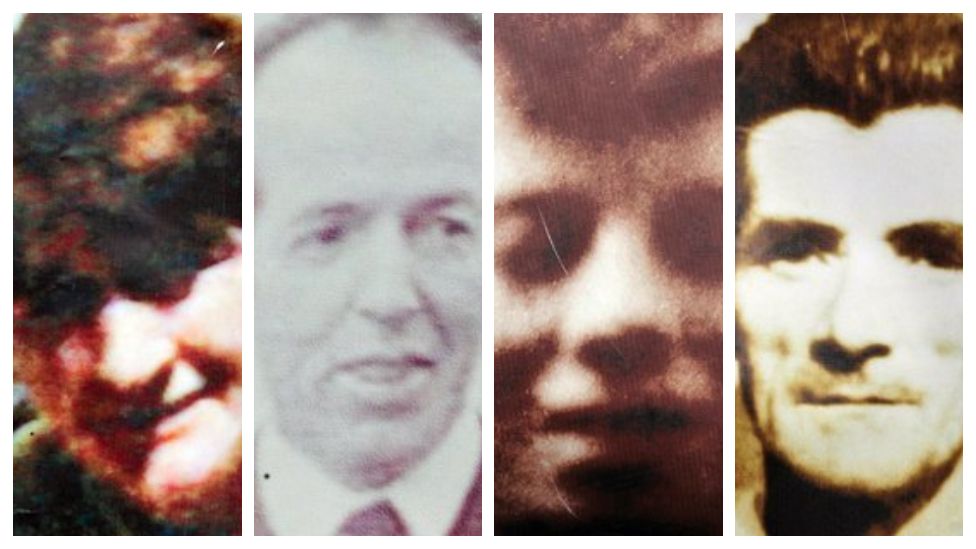
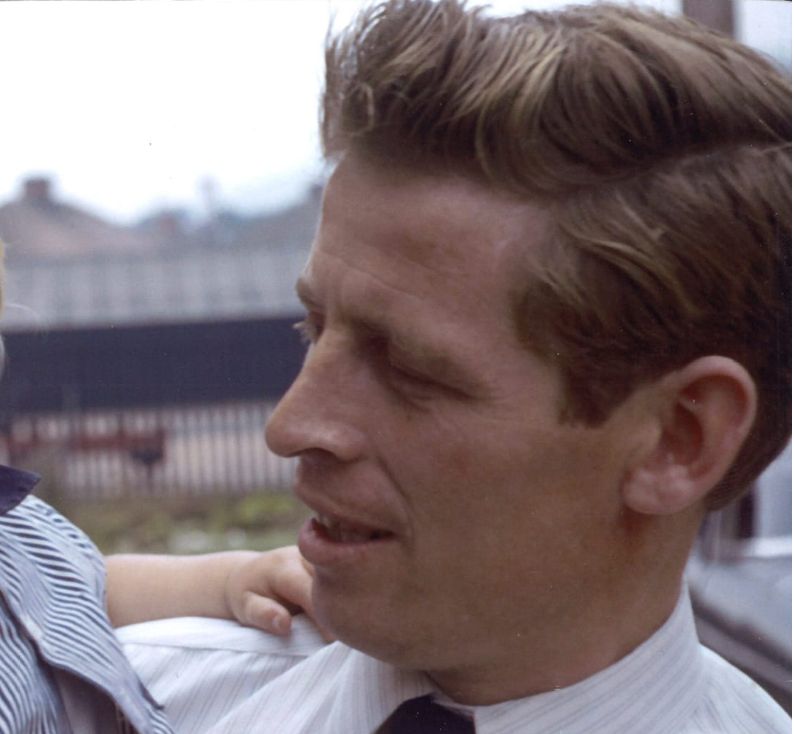
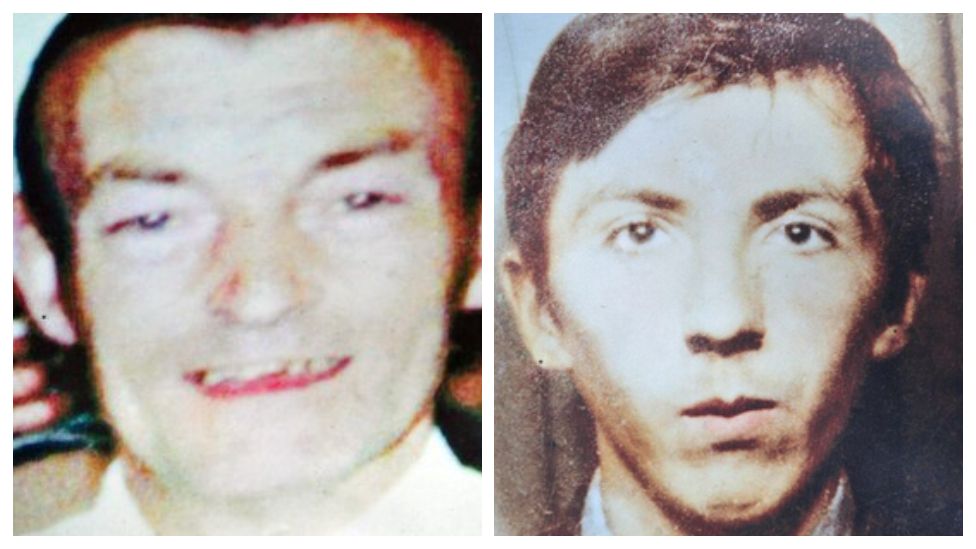
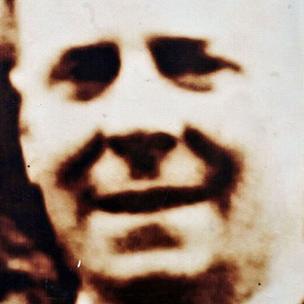
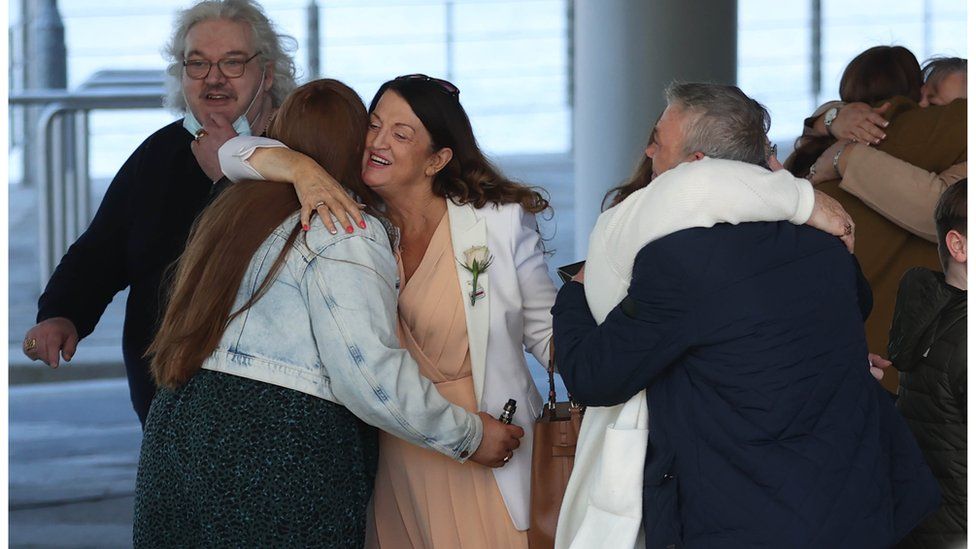
No comments:
Post a Comment